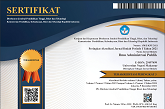Religious ethnocentrism as a potential birth of lone-wolf terrorism in Indonesia
(1) Terrorism Studies, Sekolah Kajian Stratejik dan Global (SKSG), Universitas Indonesia
(2) Terrorism Studies, Sekolah Kajian Stratejik dan Global (SKSG), Universitas Indonesia
(*) Corresponding Author
DOI: https://doi.org/10.26858/jiap.v13i1.52902
Abstract
Keywords
Full Text:
PDFReferences
Adebayo, G. O. (2021). Counter-radicalization policies and policing in education: making a case for human security in Europe. Heliyon, 7(2), e05721. https://doi.org/https://doi.org/10.1016/j.heliyon.2020.e05721
Adnan, M., & Amaliyah, A. (2021). Radicalism vs extremism: the dilemma of islam and politics in Indonesia. Jurnal Ilmu Sosial, 20(1), 24–48.
Ali, R., Özvatan, Ö., & Walter, L. (2023). The Narrative Foundations of Radical and Deradicalizing Online Discursive Spaces: A Comparison of the Cases of Generation Islam and Jamal al-Khatib in Germany. Religions. https://doi.org/10.3390/rel14020167
Almazova, L. I. (2016). Radical islamic groups in contemporary Russia: State policy and inner processes in muslim communities. Oriental Studies. https://doi.org/10.22162/2075-7794-2016-26-4-201-215
Armstrong, M. (2006). Strategic Human Resource Management: A Guide to Action. Kogan Page.
Armstrong, M. (2020). Human resource management practice. Kogan page limited.
Ataiants, J., Cohen, C., Riley, A. H., Tellez Lieberman, J., Reidy, M. C., & Chilton, M. (2018). Unaccompanied Children at the United States Border, a Human Rights Crisis that can be Addressed with Policy Change. Journal of Immigrant and Minority Health, 20(4), 1000–1010. https://doi.org/10.1007/s10903-017-0577-5
Ben‐Dor, G. (1996). The uniqueness of islamic fundamentalism. Terrorism and Political Violence. https://doi.org/10.1080/09546559608427356
Creswell, J. W., & Creswell, J. D. (2017). Research design: Qualitative, quantitative, and mixed methods approaches. Sage publications.
Ghaemmaghami, A. (2017). Islamist terrorism in Europe: a history. Journal of Contemporary European Studies. https://doi.org/10.1080/14782804.2017.1258381
Hairgrove, F. P. (2011). Media use in conversion into Islamic radicalism: Why this person and not that person, why here, why now? In ProQuest Dissertations and Theses.
Hamaid, M. (2017). Foreign fighters: a five eyes border management perspective. Journal of Policing, Intelligence and Counter Terrorism, 12(1), 47–65. https://doi.org/10.1080/18335330.2017.1294649
Hansen, S. J. (2021). IntoDarkness? Scrutinizing Economic Explanations for African Jihad. Current Trends in Islamist Ideology.
Harun, S., Avicenna, M., Mushoffa, E., & Atqa, M. (2011). The religious expression in indonesia: From orthodoxy of muslims to splinter and radicalism. In OIDA International Journal of Sustainable Development.
Lin, B., & Kaewkhunok, S. (2021). The role of socio-Culture in the solar power adoption: The inability to reach government policies of marginalized groups. Renewable and Sustainable Energy Reviews, 144(March), 111035. https://doi.org/10.1016/j.rser.2021.111035
McDowell, A., Haas, M., Seaworth, B., Wilson, J. W., Patrawalla, A., Haley, C., Lauzardo, M., de Bruyn, M., & Goswami, N. D. (2021). Linezolid use for the treatment of multidrug-resistant tuberculosis, TB centers of excellence, United States, 2013–2018. Journal of Clinical Tuberculosis and Other Mycobacterial Diseases, 22, 100201. https://doi.org/https://doi.org/10.1016/j.jctube.2020.100201
Muhammadong, D., Hadis, A., & Dewi, E. M. P. (2018). Developing a Religious Based Coaching Model to Address Problems Faced by Prisoners at First Class Detention Center Makassar. 133, 101–103. https://doi.org/10.2991/acpch-17.2018.16
Muthuswamy, M. S. (2012a). A Sharia- and Jihad-based Theory of Muslim Radicalism. SSRN Electronic Journal. https://doi.org/10.2139/ssrn.1817784
Muthuswamy, M. S. (2012b). A Social Experiment in Muslim Radicalism: Contrasting Evolution of Pakistan and India. SSRN Electronic Journal. https://doi.org/10.2139/ssrn.1766243
Neuman, W. L. (2014). Social Research Methods : Qualitative and Quantitative Approaches. Pearson Education Seventh Edition. In British Library Cataloguing in Publication Data.
Shafritz, J. M., Russell, E. W., Borick, C. P., & Hyde, A. C. (2017). Introducing public administration. Routledge Taylor & Francis Group. https://doi.org/10.1080/00922013.1975.11000035
Van Bruinessen, M. (2013). Contemporary Developments in Indonesian Islam: Explaining the" Conservative Turn". Institute of Southeast Asian Studies.
Yani, M. T., Mahfud, C., Sa’adillah, S. A. P. R., Bustami, M. R., & Taufiq, A. (2022). Advancing the discourse of Muslim politics in Indonesia: A study on political orientation of Kiai as religious elites in Nahdlatul Ulama. Heliyon, 8(12).
Yörük, E., Öker, İ., & Şarlak, L. (2019). Indigenous unrest and the contentious politics of social assistance in Mexico. World Development, 123. https://doi.org/10.1016/j.worlddev.2019.104618
Article Metrics
Abstract view : 54 times | PDF view : 10 timesRefbacks
- There are currently no refbacks.
Copyright (c) 2023 Wahyu Agung Sukhamdani, Zora Arfina Sukabdi

This work is licensed under a Creative Commons Attribution 4.0 International License.
Diterbitkan oleh:
Program Studi Ilmu Administrasi Publik
Program Pascasarjana Universitas Negeri Makassar
JIAP Index By:

This work is licensed under a Creative Commons Attribution 4.0 International License.









